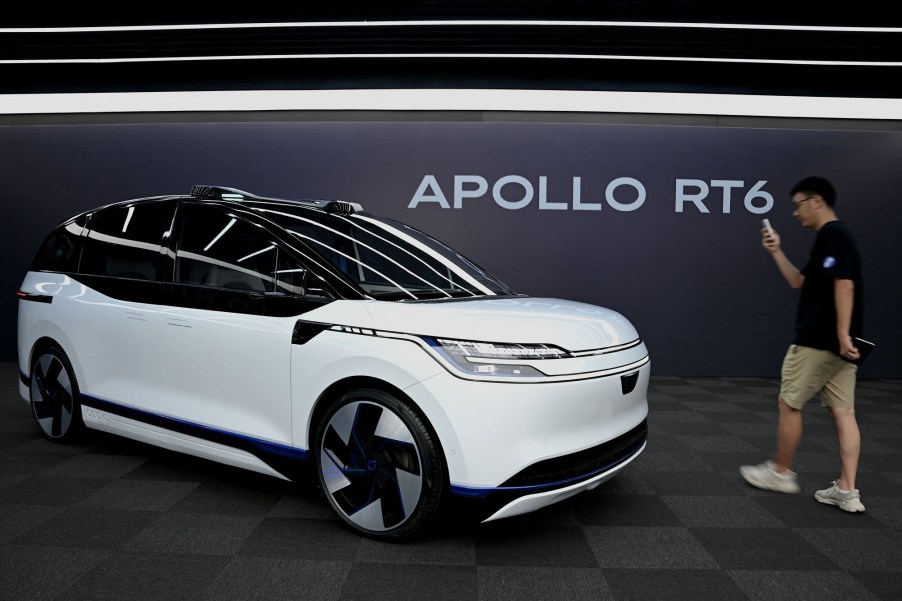
Chinese Apollo RT6 Is a Leap Forward in Self-Driving Taxis
For years, Tesla, Google, and Apple have been dabbling in the self-driving electric vehicle (EV) space. However, US-based technology titans aren’t the only ones. Baidu, a Chinese technology company, is on its sixth generation self-driving car, the Apollo RT6. So, will Baidu’s Apollo RT6 upstage companies like Tesla and Google?
Is Baidu the Chinese Google?
Baidu, like Alibaba, is a prominent Chinese internet fixture. Specifically, Baidu is a search engine entity not dissimilar to Google in the United States. However, like Google, Baidu is also a technology giant with several interests, including its robotaxi business, Apollo Go. According to CNBC, Apollo Go is on its sixth generation autonomous vehicle, which is a leap forward for the company.

What is the Apollo RT6?
The Apollo RT6 is Apollo Go’s newest Level 4 self-driving robotaxi. CNBC says its biggest claim to fame is the cost per unit. Specifically, the Apollo RT6 has a manufacturing cost of 250,000 yuan or a little over $37,000. While that may seem like a hefty price tag, it represents nearly half the manufacturing cost of the previous robotaxi. That will theoretically allow Baidu to make mass quantities of the RT6 for much less than its predecessor.
The price isn’t the Apollo’s only selling point. The RT6 is the Chinese company’s first self-driving vehicle with a detachable steering wheel. Now, before you start thinking Sparco or MOMO wheels and performance cars, Apollo’s wheel is removable for comfort. Baidu’s robotaxi marque made the steering wheel detachable because it could offer more cabin space.

What does the Apollo RT6 replace?
The Apollo RT6 replaces the Apollo Moon, another self-driving taxi in the Baidu Apollo Go lineup. However, the Moon had a production cost of 480,000 yuan (around $71,000) compared to the RT6’s considerably smaller price tag. In fact, the newer RT6 costs around 48% less to manufacture than the Moon robotaxi it replaced.
Why build self-driving taxis?
Self-driving cars seek to streamline transportation, eliminate human error, and theoretically enhance productivity. The Chinese robotaxis are no different. Apollo Go is working on lessening the financial impact of each unit so they can scale quicker.

CEO Robin Li said, “This massive cost reduction will enable us to deploy tens of thousands of AVs across China. We are moving toward a future where taking a robotaxi will be half the cost of taking a taxi today.” Also, Electrek says that the latest Apollo Level 4 vehicle is purposely built for autonomous driving and may even afford space for vending machines and entertainment consoles.
Will we have Chinese self-driving taxis in the US?
US companies like GM and Ford have plans for future autonomous vehicles. However, according to CNBC, those automakers are still negotiating with regulating agencies. Tesla and Google have been working on autonomous cars, but Tesla’s focus is clearly on consumer EVs and not robotaxis.
Conversely, Baidu’s robotaxis are already operating in 10 cities in China, with plans to scale further. That’s not all; competition like WeRide is already vying to challenge Baidu in the Chinese robotaxi market. Currently, it is unlikely that the United States will see robotaxi popularity akin to China’s for many years. Scroll down to the following article to read more about EVs!



